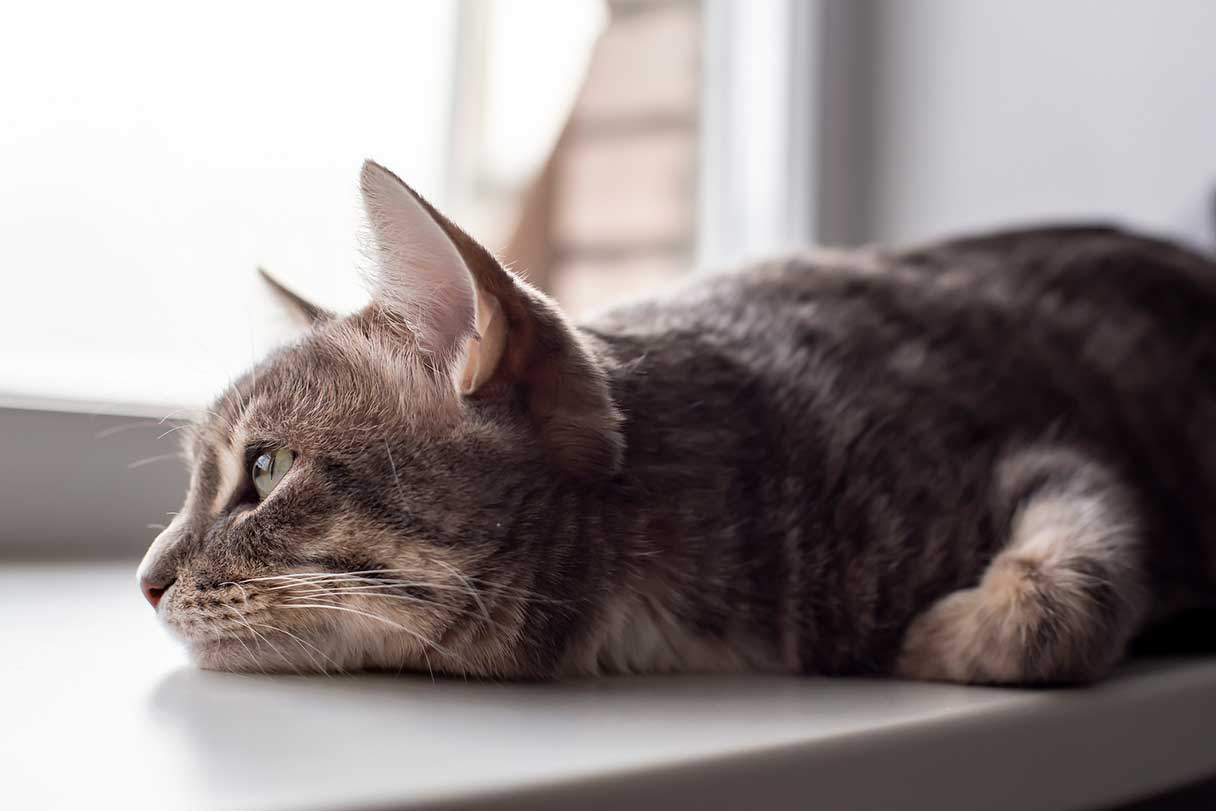It’s not always easy to tell when your cat is sick — not because you aren’t paying attention, but because they’re hardwired to mask it. In fact, hiding signs of illness is an instinctive survival tactic for cats, as showing vulnerability in the wild can leave them exposed to predators.1 Even in the comfort and familiarity of home, that instinct is still there.
So instead of expecting your cat to “tell” you something is wrong, it’s up to you to notice what’s changed and what they are doing — or not doing — that’s different from their usual behavior. Even subtle shifts can be your first clue that something isn’t right. If you notice any of the symptoms below, consult with your veterinarian.
1. Changes in Appetite
Changes to your cat's usual eating patterns or appetite could be a cause for concern. If your cat hasn’t eaten normally for 24 hours, call your vet, as they could develop a serious condition such as hepatic lipidosis or fatty liver disease. Dental disease could make your cat become finicky about food, while metabolic conditions like hyperthyroidism or diabetes mellitus can cause an increase in appetite and water intake.1
How you can help
Sometimes a cat may not eat because they are stressed, not ill. This can still lead to a dangerous situation. To encourage your cat to eat, try:2
- Feeding in a quiet area away from other cats
- Offering treats or strong-smelling foods like fish
- Smaller portions
- Talking to them and petting them while they eat (if they like that)
- Using shallow bowls, hand feeding or no bowl
- Warming up the food
2. Changes in Drinking Habits
Much like with their appetite, if your cat suddenly drinks more or less water than usual, something may be amiss. An increase in water intake could also be a sign of kidney disease, diabetes or a thyroid issue.3
How you can help
There are a few things you can do if you are concerned that your cat isn't getting enough water:4
- If your cat's water bowl is near their litter box, move it to a different spot. (This can also be helpful even if your cat's bowl is not near the litter box.)
- Provide fresh water daily.
- Switch to canned food.
- Try a different bowl or a water fountain that provides running water.
3. Drooling
Excessive drooling or salivation may be a symptom of a dental or oral issue. Drooling can also indicate nausea, exposure to or ingestion of a toxin, a foreign object (they will likely be pawing at their face as well in this case) or an injury to their mouth.5
How you can help
An important way to help your cat is to take preventative measures:5
- Brush your cat’s teeth regularly and consider routine dental cleanings.
- Keep harmful substances, including plants, household items and small objects, out of reach.
- Visit the vet regularly, which can help identify potential problems early.
4. Litter Box Changes
Both diarrhea and constipation can signal illness in cats. While diarrhea is usually easy to spot, constipation may be more difficult to notice. Small, dry stools are an early warning sign and are often linked to kidney disease.1
Changes in urination are also important to note: Urinating more often can indicate kidney or liver issues or diabetes, while urinating less frequently may suggest a urinary or kidney problem. A lack of urination can be life-threatening and requires urgent veterinary care. Straining, frequent visits to the litter box or excessive genital licking are other red flags.1
How you can help
If you've ruled out a medical issue or your cat is still having difficulty with the litter box after a medical issue, try:6
- Adding another litter box
- Changing the litter type
- Ensuring the litter box is cleaned regularly
- Moving the litter box
5. Changes in Grooming
When cats aren't feeling well, they may not groom themselves as diligently, resulting in matted fur or clumps of hair. On the flip side, if your cat is suddenly grooming constantly, they may be suffering from allergies, fleas or mites, pain in the area they are licking or even stress.1
How you can help
If your cat is unable to groom, you can help them by gently brushing their fur to prevent matting. If you find a mat, try to gently pull it apart. If you can't get it, take your cat to a groomer for help. Pay extra attention around sensitive areas like your cat's hips, belly and hind legs.7
6. Lethargy
If your typically active or playful cat is sleeping more than usual or has a lack of energy, something could be wrong.1 A change in your cat’s energy level could indicate an injury or an infection.3 Low energy levels can also be a sign of a fever.8
How you can help
Monitor for any other symptoms or changes in behavior. If you’re concerned that your cat might have a fever, you can take their temperature with a digital thermometer in their ear or use a pediatric rectal thermometer. A normal temperature range for a cat is between 100.4 degrees to 102.5 degrees Fahrenheit.8
7. Vocalization Changes
Even if your cat is naturally chatty, excessive meowing or yowling could mean they are in pain. On the other hand, if your cat is suddenly very quiet, they could be hiding an injury or illness.9
How you can help
Take your cat to the veterinarian, especially if you can't determine why your cat may be upset.9
8. Vomiting
Coughing up a hair ball is pretty common for cats, but frequent vomiting is a different situation. If you notice your cat licking their lips, salivating and repeatedly swallowing, the telltale abdominal contractions may soon follow. Vomiting can result from minor gastrointestinal upset from eating something funky, or it can be a sign of a more serious condition like an infection, disease, intestinal blockage or urinary tract obstruction.10
How you can help
If your cat cannot hold down any food at all, take them to the vet. If they can tolerate small amounts of food, your vet may suggest:11
- Feeding a bland diet at regular intervals
- Offering fresh water
- Not feeding them for a period of several hours
9. Breathing Problems
Any changes in breathing patterns, such as rapid breathing, shallow breathing or difficulty breathing, may mean your cat has a problem with their airway or lungs and requires immediate veterinary attention.1
How you can help
Take your cat to the vet immediately — this could be a life-threatening situation.1
10. Hiding
Many cats hide when they are feeling sick or injured, as this is their natural instinct to protect themselves from predators. Other cats may become clingy when they don’t feel well, so this one really depends on your cat’s unique personality.1
How you can help
Sometimes your cat may hide after a trip to the vet. But if this is unusual for your pet, your best bet is to keep an eye out for other symptoms and/or call the veterinarian for advice.
11. Changes in Appearance
Consider the overall appearance of your cat, as any weight loss or gain, hair loss, skin irritation or swelling can be signs of illness.3 Your cat may carry their head or tail differently, seem hunched or just appear different.1 Keep an eye out for other potential changes, such as:1
- Blood in the urine6
- Debris in the ears
- Discharge from the nose or eyes
- Odd odors
How you can help
Consult your veterinarian if you notice changes in your cat's appearance or behavior.
What You Can Do if Your Cat Is Sick
Unfortunately, our pets can’t tell us when something’s wrong, but keeping a close eye on their appearance and behavior can provide valuable clues. By paying close attention to changes in habits and energy, you can often catch early signs of illness before they become serious. When in doubt, a call to your veterinarian can make all the difference in keeping your cat healthy, comfortable and safe — and giving you peace of mind.
CareCredit Credit Card Financing for Cats
The CareCredit credit card is an easy way to pay for your cat’s annual checkups, food and products at veterinary practices in the CareCredit network.* Use our Acceptance Locator to find a veterinarian near you that accepts CareCredit to help keep your pet healthy and happy for a lifetime of love. CareCredit is there for you and your pet every step of the way; continue your wellness journey by downloading the CareCredit Mobile App to manage your account, find a provider on the go and easily access the Well U blog for more great articles, podcasts and videos.
In addition to pet care, you can also use your CareCredit credit card for dentistry, cosmetic, vision, hearing, health systems, dermatology, pharmacy purchases, spa treatments and so much more within the CareCredit network. How will you invest in your health and wellness next?
Author Bio
Abbie Mood is a freelance writer with more than 15 years of experience. She has worked with clients of all sizes to create compelling content and she has written for the American Kennel Club, Marriott Bonvoy, Women’s Health Online, Headspace and more.








